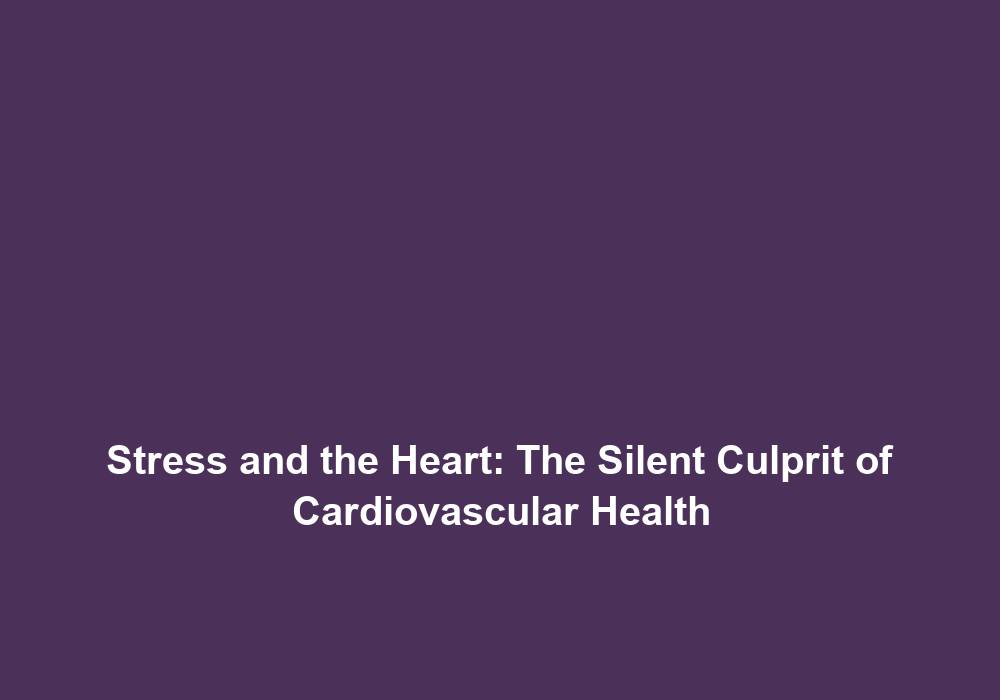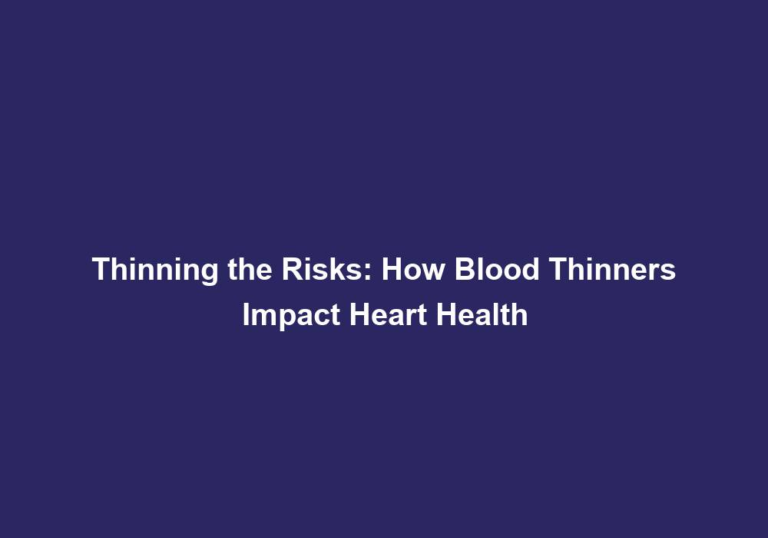Stress and the Heart: The Silent Culprit of Cardiovascular Health
In today’s fast-paced and demanding world, stress has become an inevitable part of our lives. While a certain amount of stress can be beneficial, chronic and excessive stress can have severe effects on our overall health, particularly on our cardiovascular system. In this article, we will explore the relationship between stress and the heart, shedding light on the silent culprit that undermines our cardiovascular health.
Understanding Stress
Before delving into the impact of stress on the heart, it is essential to understand what stress actually is. Stress is the body’s natural response to any demand or threat, triggering a cascade of physiological and psychological reactions. It can be caused by various factors, such as work pressure, financial difficulties, or relationship problems. While short bursts of stress can be helpful in certain situations, chronic stress poses a significant risk to our cardiovascular well-being.
Chronic stress can lead to a constant release of stress hormones like cortisol and adrenaline, which in turn can have negative effects on the heart. These hormones cause an increase in heart rate and blood pressure, putting excessive strain on the cardiovascular system. Over time, sustained high blood pressure can increase the risk of heart disease, heart attack, and stroke.
The Stress-Heart Connection
Stress and Blood Pressure
One of the primary ways in which stress affects the heart is by influencing blood pressure levels. When we encounter stressful situations, our body releases stress hormones like cortisol and adrenaline, which cause an increase in heart rate and blood pressure. While this response is temporary and usually subsides once the stressor is eliminated, prolonged or frequent episodes of stress can lead to sustained high blood pressure.
Elevated blood pressure puts excessive strain on the heart and arteries, increasing the risk of heart disease, heart attack, and stroke. It is important to note that individuals with pre-existing hypertension are particularly vulnerable to the detrimental effects of stress on blood pressure.
Stress and Inflammation
Moreover, stress contributes to an inflammatory response within the body. When we experience stress, the body’s immune system triggers the release of chemicals that promote inflammation. While inflammation is a natural defense mechanism, chronic inflammation can damage blood vessels and increase the risk of atherosclerosis.
Atherosclerosis is a condition where plaque builds up in the arteries, narrowing them and restricting blood flow to the heart. This can result in chest pain, heart attacks, and other cardiovascular complications. It is crucial to manage stress effectively to reduce chronic inflammation and protect the health of our arteries.
Stress and Cholesterol
Additionally, chronic stress can impact cholesterol levels. Stress has been found to increase the production of LDL cholesterol, commonly referred to as bad cholesterol, while simultaneously reducing HDL cholesterol, known as good cholesterol. Elevated levels of LDL cholesterol contribute to the formation of plaque in the arteries, further increasing the risk of heart disease and related complications.
Managing stress effectively is essential not only for maintaining optimal cholesterol levels but also for overall cardiovascular health.
Managing Stress for Heart Health
Given the detrimental effects of stress on the heart, it is crucial to adopt effective stress management techniques to safeguard our cardiovascular health. Here are some strategies that can help reduce stress levels:
1. Relaxation Techniques
Incorporating relaxation techniques into your daily routine can significantly reduce stress. Practices such as deep breathing exercises, meditation, yoga, and progressive muscle relaxation have been shown to lower blood pressure, reduce heart rate, and promote overall well-being.
Additionally, mindfulness-based stress reduction techniques, such as guided imagery and visualization, can help calm the mind and alleviate stress. These techniques can be practiced at any time and in any place, making them accessible and convenient for individuals seeking stress relief.
2. Regular Exercise
Engaging in regular physical activity has been proven to be an effective stress reliever. Exercise releases endorphins, the body’s natural mood boosters, which help combat stress and enhance mental well-being. Aim for at least 150 minutes of moderate-intensity exercise per week, such as brisk walking, jogging, cycling, or swimming.
In addition to its stress-reducing benefits, regular exercise also improves cardiovascular health by strengthening the heart and improving blood circulation. It is important to choose activities that you enjoy and make them a regular part of your routine to reap the long-term benefits.
3. Healthy Diet
Maintaining a balanced and nutritious diet plays a significant role in managing stress and promoting heart health. Include plenty of fruits, vegetables, whole grains, lean proteins, and healthy fats in your meals. These foods are rich in vitamins, minerals, and antioxidants that can help combat the negative effects of stress on the body.
Avoid excessive consumption of processed foods, sugary snacks, and beverages, as they can contribute to inflammation and negatively impact cardiovascular health. Incorporating stress-busting foods such as dark chocolate, berries, nuts, and green leafy vegetables can provide additional benefits for both your stress levels and heart health.
4. Adequate Sleep
Prioritizing quality sleep is essential for stress reduction and overall well-being. Lack of sleep can exacerbate stress levels and increase the risk of heart disease. Aim for 7-8 hours of uninterrupted sleep each night and establish a consistent sleep routine.
Creating a relaxing bedtime routine, such as avoiding electronic devices before bed, keeping your bedroom cool and dark, and practicing relaxation techniques, can help improve sleep quality. If you struggle with sleep, consider consulting a healthcare professional for guidance and potential interventions.
5. Social Support
Building strong social connections and seeking support from loved ones can help alleviate stress. Engage in activities that foster positive relationships, such as spending time with family and friends or participating in community groups. Sharing your feelings and concerns with trusted individuals can provide emotional support and help reduce stress levels.
In addition to personal relationships, joining support groups or seeking professional counseling can provide valuable guidance and coping mechanisms for managing stress effectively. Connecting with others who may be experiencing similar challenges can offer a sense of belonging and understanding.
6. Time Management
Effective time management techniques can help reduce stress by promoting a sense of control and organization. Prioritize tasks, set realistic goals, and delegate responsibilities when necessary. Break larger tasks into smaller, manageable steps to avoid feeling overwhelmed.
Utilize tools such as calendars, to-do lists, and time-blocking methods to schedule your day and allocate time for self-care and relaxation. By managing your time efficiently, you can reduce stress levels and create a better work-life balance.
7. Seek Professional Help
If stress becomes overwhelming and starts to significantly impact your daily life, seeking professional help from a therapist or counselor can be beneficial. They can provide guidance, support, and teach coping mechanisms to better manage stress.
Therapeutic interventions, such as cognitive-behavioral therapy (CBT) or stress management counseling, can help individuals develop healthy coping strategies and address underlying issues contributing to chronic stress. Remember, seeking help is a sign of strength, and professional assistance can make a significant difference in managing stress and improving overall well-being.
Conclusion
Stress, if left unmanaged, can silently wreak havoc on our cardiovascular health. From increasing blood pressure and inflammation to altering cholesterol levels, chronic stress poses a significant risk to our hearts. By adopting stress management techniques and making lifestyle changes, we can protect our hearts from the silent culprit of stress.
Prioritizing relaxation, regular exercise, a healthy diet, adequate sleep, social support, effective time management, and seeking professional help when needed can all contribute to a healthier and happier heart. Remember, taking care of your mental well-being is equally as important as maintaining physical health for a robust cardiovascular system.







